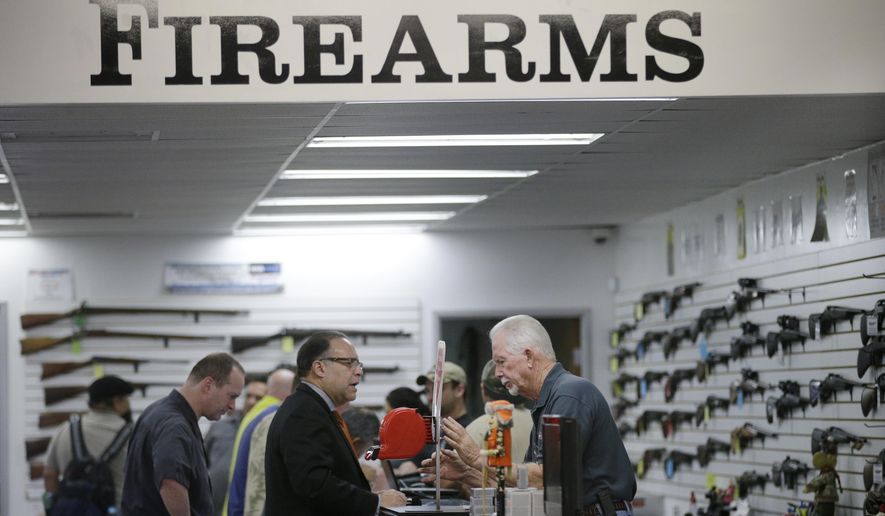The Supreme Court declined Tuesday to hear a challenge to California’s 10-day waiting period for gun purchases, as the federal courts continued to embrace limits on the extent of Second Amendment rights.
The ruling, which Justice Clarence Thomas fiercely criticized as a surrender of core constitutional protections, comes as Congress and states look at adding even more restrictions in the wake of another mass shooting at a school.
Lawmakers are pondering everything from bans on semiautomatic rifles to fights over listing more people as banned buyers in the federal background check system, and analysts said federal courts are giving them plenty of room.
“The courts are continuing to recognize that states have the authority to pass reasonable public safety laws to protect their citizens from gun violence,” said Eric Tirschwell, litigation director for the group Everytown for Gun Safety.
Tuesday’s decision lets stand a ruling by the 9th U.S. Circuit Court of Appeals upholding the 10-day waiting period. Gun-rights groups had argued it shouldn’t apply to people who already own a firearm or who have a concealed carry license.
The justices declined to take the case, without further comment.
But in a 14-page dissent, Justice Thomas said the high court’s “continued inaction” in the area of gun rights indicates it does not put the Second Amendment on equal footing with other provisions in the Bill of Rights.
“If a lower court treated another right so cavalierly, I have little doubt that this Court would intervene,” he wrote. “But as evidenced by our continued inaction in this area, the Second Amendment is a disfavored right in this Court.”
Alan Gottlieb, founder of the Second Amendment Foundation, agreed.
“I’m highly disappointed that the Supreme Court didn’t take the case, and it’s treating the Second Amendment as an orphan in the Bill of Rights,” said Mr. Gottlieb, whose group had sought the high court’s review of the case. as had the Calguns Foundation.
Tuesday’s move was the latest in a pattern of the justices shying away from reviewing lower-court rulings upholding state-passed gun controls, said Robert Spitzer, a political science professor at SUNY Cortland.
“Frankly, I don’t think they want any part of gun cases,” said Mr. Spitzer, who has written several books on gun policy. “It’s just too roiling and contentious, especially in the atmospherics that we’re in right now.”
The high court had appeared to be moving the other direction with landmark rulings in 2008 and 2010 that established the Second Amendment grants individuals the right to have a gun for self-protection.
But since then, justices have been hesitant to take up cases that explore the boundaries of those decisions.
In November, the Supreme Court declined to take up an appeal challenging Maryland’s ban on military-style, semiautomatic weapons, as well as a separate case challenging Florida’s ban on openly carrying guns in public. And last June, it declined to take up a challenge to California’s concealed-carry limits.
Last week’s Florida shooting has reignited the push at the federal level for stricter controls.
Nikolas Cruz, the 19-year-old man who police say has admitted to the shooting that killed 17 students and faculty members at his former high school, legally purchased the AR-15-style semiautomatic gun he used in the attack.
The FBI acknowledged last week that it failed to follow up on a tip last month from someone close to Mr. Cruz who said the shooter had a gun and that he wanted to hurt people.
That’s left some arguing the issue isn’t firepower but rather mental health.
A bipartisan group of senators is trying to coalesce around a measure that would incentivize states and federal agencies to submit more records to the National Instant Criminal Background Check System (NICS), in hopes of flagging people who have been deemed mentally ill or are otherwise barred from having guns.
Still others are calling for more guns in schools, either through armed security officers or teachers themselves, to give potential victims more of a chance to directly fight back in an active shooter situation.
Mr. Spitzer said that at least at the federal level, expectations for any new broad, sweeping laws should be tempered.
“The most optimistic outcome for those who want to see any change would be this improved record-keeping sort of bill, because they can get the support and [President] Trump would sign it, by all indications,” he said.
• David Sherfinski can be reached at dsherfinski@washingtontimes.com.




Please read our comment policy before commenting.